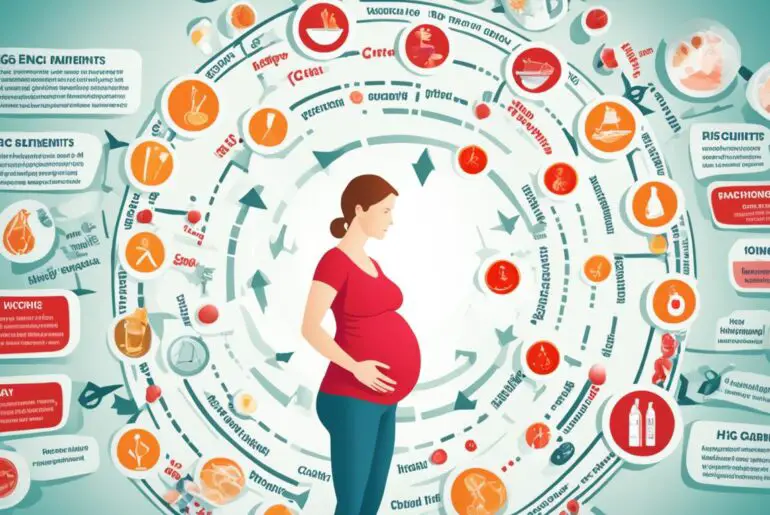Did you know that the HCG diet, which involves consuming just 500 calories per day and taking the HCG hormone, is not recommended for weight loss during pregnancy? While it may sound tempting to shed those extra pounds, it’s important to understand the potential risks and concerns associated with this diet when expecting a baby.
HCG, or human chorionic gonadotropin, is a hormone naturally produced during pregnancy and is used to treat fertility issues. While HCG therapy can be beneficial for increasing fertility, it should not be used as a weight loss aid during pregnancy. Excess HCG hormones could have negative effects on the pregnancy and the well-being of both the mother and the baby.
Key Takeaways:
- The HCG diet is not recommended for weight loss during pregnancy.
- HCG therapy is used to treat fertility issues and should be discontinued once pregnancy is achieved.
- Pregnant women should prioritize a balanced diet and consult with healthcare providers for safe and appropriate weight management recommendations.
- Severely restricting calorie intake can have negative effects on overall health and may lead to nutrient deficiencies.
- Professional medical advice is essential in making informed decisions about weight management and diet during pregnancy.
When to Try the HCG Diet
If you are considering the HCG diet, it is important to understand when it may be appropriate to explore this weight loss method. However, it is crucial to note that the HCG diet is not recommended for pregnant women due to its restrictive calorie intake and potential impact on fetal health. It is best to prioritize a healthy and balanced diet when preparing for pregnancy and consult with healthcare experts for personalized guidance.
While the HCG diet has gained popularity as a weight loss solution, it is not suitable for pregnant women due to the potential risks it poses. The diet involves severely restricting calorie intake, typically to 500 calories per day, which might not provide sufficient nutrients for both your body and the developing baby.
So, when is the right time to consider the HCG diet?
If you are not trying to become pregnant and are looking for a weight loss solution, you may explore the HCG diet. It is crucial to work closely with healthcare professionals who specialize in weight management to develop a safe and effective plan tailored to your specific needs.
However, it is important to note that the HCG diet should not be pursued without proper medical guidance. Seeking expert advice on the HCG diet is essential to ensure the diet is suitable for your individual circumstances and to minimize any potential risks.
It is always recommended to prioritize your health and speak with a healthcare provider before embarking on any weight loss program, especially during pregnancy or when planning to conceive.
| HCG Diet Considerations for Pregnancy |
|---|
| 1. Severe calorie restriction can lead to nutrient deficiencies 2. Potential risks to fetal health 3. Expert advice is crucial for pregnant women 4. Prioritize a healthy and balanced diet 5. Consult with healthcare professionals for personalized guidance |
Remember, your health and the well-being of your baby are of utmost importance. Always consult with medical experts, such as obstetricians and gynecologists, to address any concerns and receive appropriate guidance for weight management during pregnancy.
Safety and Effectiveness of the HCG Diet
The HCG diet is a controversial weight loss method that involves severely restricting calorie intake and taking the human chorionic gonadotropin (HCG) hormone. However, it is important to note that the HCG diet is not considered safe or effective for weight loss, especially during pregnancy. The Food and Drug Administration (FDA) advises against using over-the-counter HCG products for weight loss, as they are not approved and may pose health risks.
Severely limiting calorie intake can have negative effects on overall health and may lead to nutrient deficiencies, which can be particularly detrimental to pregnant women and their developing babies. Instead of following the HCG diet during pregnancy, it is recommended to prioritize a balanced diet that provides sufficient nutrients for both the mother and the baby.
It is crucial for expectant mothers to consult with a healthcare provider for safe and appropriate weight management recommendations. Obstetricians and gynecologists can provide personalized advice based on individual needs and circumstances. By seeking professional medical advice, pregnant women can ensure the health and well-being of both themselves and their babies.
The Risks and Side Effects

Following the HCG diet, especially during pregnancy, can have various risks and side effects. It is crucial to prioritize the health and safety of both the mother and the developing baby, which is why the HCG diet is not recommended in this context.
Some of the risks and side effects associated with the HCG diet during pregnancy include:
- Fatigue: Severe calorie restriction can lead to increased fatigue and low energy levels, which can be harmful to both the mother and the baby.
- Irritability and Restlessness: The extreme dieting approach of the HCG diet may cause feelings of irritability and restlessness, leading to emotional distress.
- Depression: The restrictive nature of the diet can also contribute to feelings of depression and decreased mental well-being.
- Fluid Buildup: Drastic changes in fluid intake can disrupt the body’s fluid balance, leading to fluid buildup in tissues and potentially causing issues such as swelling.
- Swelling of the Breasts: The HCG diet may result in hormonal changes that cause breast swelling, discomfort, and tenderness.
- Risk of Blood Clots: Severely limiting calorie intake may increase the risk of blood clots, which can be dangerous during pregnancy.
Given these potential risks and side effects, it is important to explore safer alternatives and prioritize the well-being of both the mother and the baby. The HCG diet should not be considered a suitable option during pregnancy.
| Risks and Side Effects | Description |
|---|---|
| Fatigue | Severe calorie restriction can lead to increased fatigue and low energy levels. |
| Irritability and Restlessness | The extreme dieting approach of the HCG diet may cause feelings of irritability and restlessness, leading to emotional distress. |
| Depression | The restrictive nature of the diet can contribute to feelings of depression and decreased mental well-being. |
| Fluid Buildup | Drastic changes in fluid intake can disrupt the body’s fluid balance, leading to fluid buildup in tissues and potentially causing issues such as swelling. |
| Swelling of the Breasts | The HCG diet may result in hormonal changes that cause breast swelling, discomfort, and tenderness. |
| Risk of Blood Clots | Severely limiting calorie intake may increase the risk of blood clots, which can be dangerous during pregnancy. |
Seeking Professional Medical Advice
When it comes to weight management and diet during pregnancy, it is essential for expectant mothers to prioritize their health and the well-being of their baby. Seeking professional medical advice from healthcare providers, particularly obstetricians and gynecologists, is crucial in making informed decisions.
Healthcare providers have the expertise and knowledge to provide personalized recommendations and guidance based on individual needs and circumstances. They can offer medical advice for the HCG diet during pregnancy and provide expert advice on the HCG diet for pregnant women. By consulting with healthcare professionals, expectant mothers can receive reliable information and ensure the health and safety of both themselves and their baby.
“Professional medical advice is essential for pregnant women to make informed decisions about weight management and diet during pregnancy.”
Obstetricians and gynecologists specialize in women’s health and are familiar with the specific considerations and precautions that need to be taken during pregnancy. They can provide HCG diet doctor recommendations for expectant mothers, taking into account the unique needs and circumstances of each individual. By consulting with these professionals, pregnant women can receive expert guidance and support, ensuring they are on the right track for a healthy pregnancy.
Ultimately, the well-being of both the mother and the baby should always be the top priority. Seeking professional medical advice ensures that pregnant women receive accurate and reliable information tailored to their specific situation. It is important to consult with healthcare providers to make safe and informed decisions regarding weight management and diet during pregnancy.
Example Table: Healthcare Providers Offering Expert Advice
| Healthcare Provider | Specialization | Contact Information |
|---|---|---|
| Dr. Emily Johnson | Obstetrics and Gynecology | Phone: 555-123-4567 Email: emilyjohnson@obgynclinic.com |
| Dr. Michael Davis | Women’s Health Specialist | Phone: 555-987-6543 Email: michaeldavis@womenshealthclinic.com |
| Dr. Sarah Anderson | Reproductive Endocrinology | Phone: 555-567-8901 Email: sarahanderson@endocrinologyclinic.com |
Pregnancy Care and Support
During pregnancy, it is crucial for expectant mothers to have access to comprehensive care and support. OB/GYN clinics, such as University OB/GYN Associates, specialize in providing healthcare services tailored to the unique needs of pregnant women.
Pre-Pregnancy and Post-Partum Planning: These clinics offer assistance with pre-pregnancy planning and post-partum care, ensuring a smooth transition throughout the entire pregnancy journey. They provide expert guidance on various aspects, including dietary advice and weight management recommendations.
Regular Check-ups and Healthcare Services: OB/GYN clinics offer regular check-ups to monitor the health and progress of both the mother and the baby. These check-ups may include pap smears, ultrasounds, and other necessary tests to ensure a healthy pregnancy. The clinics also provide a range of healthcare services to support the overall well-being of women.
Expert Medical Advice: Expectant mothers can rely on the expertise of the healthcare professionals at OB/GYN clinics. These professionals have specialized knowledge and experience in caring for pregnant women. They can provide medical advice and address specific concerns related to weight management, diet, and overall health during pregnancy.
By seeking the guidance of healthcare providers at OB/GYN clinics, expectant mothers can ensure a healthy and well-supported pregnancy. These clinics prioritize the health and safety of both the mother and the baby, offering personalized care and support throughout the entire pregnancy journey.
FDA Warnings and Regulation

When it comes to weight management during pregnancy, it’s crucial to prioritize the health and safety of both the expectant mother and the developing baby. The FDA has issued specific warnings and regulations regarding the use of HCG products for weight loss during pregnancy. It is important to be aware of these guidelines and consult with healthcare providers for safe and appropriate weight management recommendations.
“The FDA has determined that over-the-counter HCG products labeled as weight loss aids are illegal.”
The FDA considers over-the-counter HCG products that are labeled as weight loss aids to be illegal. These products are not approved for weight loss and using them during pregnancy can be especially risky. It is essential for expectant mothers to avoid unregulated HCG products and seek guidance from healthcare providers who can provide safe and suitable weight management recommendations for pregnancy.
Regulatory Compliance: Protecting the Health of Expectant Mothers
The FDA’s warnings and regulations regarding HCG products for weight loss are in place to protect the health of expectant mothers and their babies. By adhering to these guidelines and seeking professional medical advice, expectant mothers can ensure they are making informed decisions about their weight management during pregnancy.
Consulting with Healthcare Providers
Expectant mothers should consult with healthcare providers, such as obstetricians and gynecologists, for personalized advice on weight management during pregnancy. These healthcare professionals can provide essential guidance and support, ensuring that expectant mothers are following safe and appropriate practices for their specific needs.
FDA Guidelines on HCG Diet and Pregnancy
| Guideline | Description |
|---|---|
| Over-the-counter HCG products | Considered illegal and not approved for weight loss during pregnancy |
| Seek professional medical advice | Important for safe and suitable weight management recommendations |
| Regulatory compliance | Protects the health and well-being of expectant mothers |
In conclusion, it is crucial to be aware of the FDA’s warnings and regulations regarding the use of HCG products for weight loss during pregnancy. Following these guidelines and consulting with healthcare providers ensures the health and safety of both the mother and the developing baby. Prioritizing professional medical advice and guidance helps expectant mothers make informed decisions about their weight management journey during pregnancy.
Safer Alternatives for Weight Loss
Instead of following the HCG diet during pregnancy, it is recommended to focus on maintaining a healthy pregnancy through a balanced diet and regular exercise. Safe and appropriate weight management can be achieved by working with healthcare providers to develop a personalized plan. This may include increasing physical activity, incorporating nutritious foods, and seeking support from professionals who specialize in pregnancy healthcare.
Key Recommendations:
- Consult with a healthcare provider: Seek professional medical advice to ensure safe and effective weight management during pregnancy.
- Develop a personalized plan: Work with healthcare providers to create a comprehensive plan that takes into account your specific needs and circumstances.
- Incorporate regular exercise: Engage in physical activity that is safe for pregnant women, such as walking, swimming, or prenatal yoga.
- Eat a balanced diet: Focus on consuming nutrient-rich foods, including fruits, vegetables, whole grains, lean proteins, and healthy fats.
- Stay hydrated: Drink plenty of water to support overall health and well-being.
- Seek support: Reach out to professionals who specialize in pregnancy healthcare for guidance and assistance throughout your pregnancy journey.
“Maintaining a balanced diet and engaging in regular exercise are key components of a healthy pregnancy. By working with healthcare providers and prioritizing your well-being, you can achieve safe and appropriate weight management during this important time.”
Remember, each pregnancy is unique, and it is important to consult with a healthcare professional for personalized advice. They can provide guidance tailored to your specific needs and help you maintain a healthy pregnancy.
Addressing Dietary Concerns

Maintaining a healthy pregnancy involves addressing dietary concerns and ensuring the safe HCG diet during pregnancy. It is essential to prioritize a balanced diet that provides the necessary nutrients for both the mother and the baby. Here are some pregnancy and HCG diet precautions to keep in mind:
1. Prioritize a Balanced Diet
A balanced diet is crucial for meeting the nutritional needs of both the expectant mother and her baby. It is recommended to include a variety of fruits, vegetables, whole grains, lean proteins, and healthy fats in the diet. These foods provide essential vitamins, minerals, and antioxidants that promote fetal development and support the mother’s overall health during pregnancy.
2. Stay Hydrated
Proper hydration is vital for a healthy pregnancy. Drinking an adequate amount of water throughout the day helps to maintain healthy amniotic fluid levels, supports digestion, and prevents dehydration. Pregnant women should aim to drink at least 8-10 cups of water daily and avoid sugary or caffeinated beverages that can lead to unnecessary calorie intake and potential complications.
3. Avoid Harmful Substances
During pregnancy, it is crucial to avoid foods and substances that may be harmful to the baby. This includes alcohol, tobacco, and recreational drugs. Additionally, certain foods should be avoided or consumed with caution due to the risk of foodborne illnesses, such as undercooked meats, unpasteurized dairy products, raw seafood, and high-mercury fish. Engaging in safe food handling practices and following dietary guidelines can help prevent potential harm to both the mother and the baby.
4. Consult with a Healthcare Provider
Every pregnancy is unique, and it is important to consult with a healthcare provider for individualized advice and guidance. Healthcare professionals, such as obstetricians and nutritionists, can provide valuable recommendations based on personal health history, dietary preferences, and specific needs. They can offer safe HCG diet during pregnancy and help address any concerns or questions regarding the HCG diet during pregnancy. Seeking professional healthcare advice ensures that the expectant mother receives appropriate, evidence-based guidance for maintaining a healthy pregnancy.
“A balanced diet and consulting with a healthcare provider are key to ensuring a safe HCG diet during pregnancy. By prioritizing nutrition and avoiding harmful substances, expectant mothers can support their own health and the well-being of their baby.”
Addressing dietary concerns during pregnancy is essential for promoting a healthy and safe HCG diet during pregnancy. By maintaining a balanced diet, staying hydrated, avoiding harmful substances, and seeking guidance from healthcare providers, expectant mothers can optimize their nutritional intake and support the well-being of both themselves and their babies.
Conclusion
When it comes to weight management and diet during pregnancy, it is important to prioritize the health and well-being of both the expectant mother and the baby. The HCG diet, while popular for weight loss, is not recommended for pregnant women due to potential risks and the lack of evidence regarding its effectiveness in this context.
Instead, maintaining a healthy pregnancy involves seeking professional medical advice from healthcare providers who specialize in women’s health. These experts can provide personalized recommendations and guidance on maintaining a balanced and nutrient-rich diet that supports the needs of both the mother and the developing baby.
Ensuring a healthy pregnancy also requires personalized care and support throughout the journey. OB/GYN clinics, such as University OB/GYN Associates, offer comprehensive services to support expectant mothers, including pre-pregnancy and post-partum planning, regular check-ups, and dietary advice. Prioritizing professional medical care can help ensure the best outcomes for both the mother and the baby.
In conclusion, when it comes to weight management during pregnancy, it is important to follow the recommendations of healthcare providers who specialize in women’s health. The HCG diet is not recommended, and instead, expectant mothers should focus on maintaining a balanced and nutrient-rich diet under the guidance of medical professionals. By prioritizing health and seeking expert advice, women can ensure a healthy and successful pregnancy.
FAQ
Are there doctor recommendations for the HCG diet during pregnancy?
No, the HCG diet, which involves severe calorie restriction and the use of the hCG hormone, is not recommended for weight loss during pregnancy. It is best to consult with a healthcare provider for safe and appropriate weight management recommendations during this time.
When is it safe to try the HCG diet?
It is advisable to try the HCG diet when you are not trying to become pregnant. The HCG diet involves severely restricting calorie intake, which may not provide sufficient nutrients for both your body and a developing baby. Prioritizing a healthy and balanced diet is essential when preparing for pregnancy.
Is the HCG diet safe and effective during pregnancy?
No, the HCG diet is not considered safe or effective for weight loss. The Food and Drug Administration (FDA) advises against using over-the-counter HCG products for weight loss, as they are not approved and may pose health risks. Severely limiting calorie intake can have negative effects on overall health and may lead to nutrient deficiencies. It is important to prioritize a balanced diet and consult with a healthcare provider for safe and appropriate weight management recommendations.
What are the risks and side effects of following the HCG diet during pregnancy?
Following the HCG diet, especially during pregnancy, can have various risks and side effects. These may include fatigue, irritability, restlessness, depression, fluid buildup, swelling of the breasts, and the risk of blood clots. It is important to prioritize the health and safety of both the mother and the developing baby, and the HCG diet is not recommended in this context.
When should I seek professional medical advice for weight management and diet during pregnancy?
It is crucial for pregnant women to seek professional medical advice from healthcare providers, especially obstetricians and gynecologists, when it comes to weight management and diet during pregnancy. These professionals can provide personalized recommendations and guidance based on individual needs and circumstances.
Where can I get pregnancy care and support?
OB/GYN clinics, such as University OB/GYN Associates, provide comprehensive care and support for women during pregnancy. These clinics offer pre-pregnancy and post-partum planning, including dietary advice and guidance on weight management. They also offer regular check-ups, pap smears, and other healthcare services to ensure the overall well-being of women. It is important for expectant mothers to have access to professional medical care and support throughout their pregnancy journey.
Are there any FDA warnings or regulations regarding the HCG diet during pregnancy?
The FDA has issued warnings against using HCG products for weight loss, as they are not approved for this purpose. Over-the-counter HCG products are considered illegal, and companies that sell them are breaking the law. It is essential to be cautious of unregulated products and to consult with healthcare providers for safe and appropriate weight management recommendations during pregnancy.
What are safer alternatives for weight loss during pregnancy?
Instead of following the HCG diet during pregnancy, it is recommended to focus on maintaining a healthy pregnancy through a balanced diet and regular exercise. Safe and appropriate weight management can be achieved by working with healthcare providers to develop a personalized plan. This may include increasing physical activity, incorporating nutritious foods, and seeking support from professionals who specialize in pregnancy healthcare.
How can I address dietary concerns during pregnancy?
Maintaining a healthy pregnancy involves addressing dietary concerns and ensuring adequate intake of essential nutrients. It is important to prioritize a balanced diet that includes a variety of fruits, vegetables, whole grains, lean proteins, and healthy fats. Pregnant women should also focus on staying hydrated and avoiding foods and substances that may be harmful to the baby. Consulting with a healthcare provider can provide valuable guidance on meeting nutritional needs during pregnancy.
What are the overall recommendations for the HCG diet during pregnancy?
When it comes to weight management and diet during pregnancy, the HCG diet is not recommended due to potential risks and lack of evidence of effectiveness. It is crucial for expectant mothers to prioritize their health and the well-being of their baby by seeking professional medical advice and following a balanced and nutrient-rich diet. Maintaining a healthy pregnancy involves personalized care and support from healthcare providers who specialize in women’s health.




